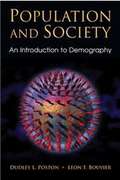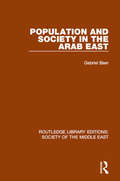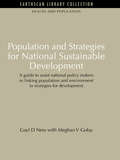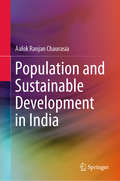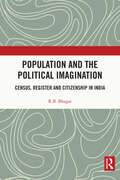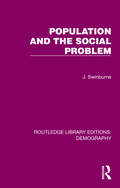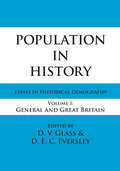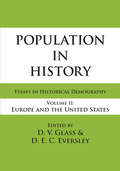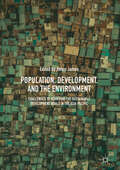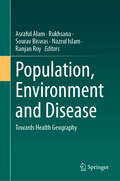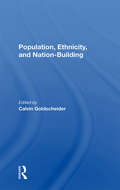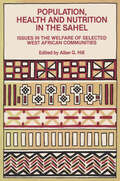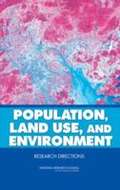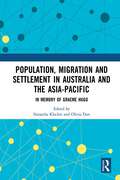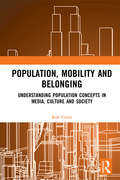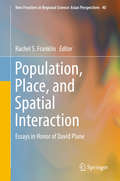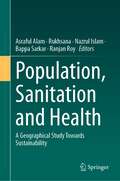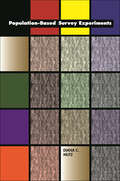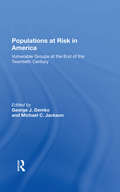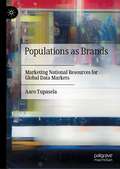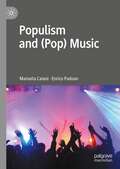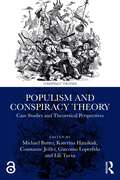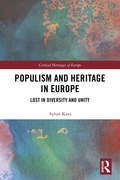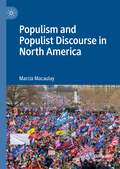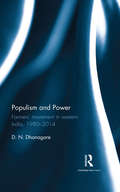- Table View
- List View
Population and Society
by Dudley L. Poston Leon F. BouvierPopulation and Society: An Introduction to Demography is an ideal text for undergraduate, as well as graduate, students taking their first course in demography. It is sociologically oriented, although economics, political science, geography, history, and the other social sciences are also used to inform the materials. Although the emphasis is on demography, the book recognizes that, at the individual level, population change is related to private decisions, especially in relation to fertility, but also to mortality and migration. The text thus considers in some detail the role of individuals in population decision making. At the level of countries, and even the world, changes in population size have an important effect on the environmental and related challenges facing all of the world's inhabitants. Therefore, attention is paid to the broad implications of population growth and change.
Population and Society in the Arab East (Routledge Library Editions: Society of the Middle East #16)
by Gabriel BaerThis book, first published in English in 1964, examines a wide range of topics concerning society in the Arab East. Chapters are concerned with woman and the family; religious and linguistic communities; bedouins, fellas and townsmen; and the various social and economic classes and strata. While there are no special sections devoted to geography, economics, culture, trends of thought, and the historical and political developments of the Arab Eastern countries, there is scarcely a page which does not touch on one or another of them.
Population and Strategies for National Sustainable Development: Population and Strategies for National Sustainable Development (Health and Population Set)
by Gayl D Ness Meghan V GolayFirst Published in 2009. Routledge is an imprint of Taylor & Francis, an informa company.
Population and Sustainable Development in India
by Aalok Ranjan ChaurasiaThis book addresses central issues related to population and sustainable development in India, the second most populous country in the world. Using the latest available source of data in the context of the United Nations 2030 Sustainable Development Agenda, it analyzes the current state of development in India in terms of economic growth, social inclusion, and environmental protection, especially focusing on the role of population. The respective chapters explore various aspects, but mainly focus on promoting greater sustainability in terms of population growth, child survival, and economic growth. As such, the book will be of interest to students, researchers, and policymakers in the fields of population studies, economics, and international development.
Population and the Political Imagination: Census, Register and Citizenship in India
by R.B. BhagatThis book identifies population as a central issue of polity and examines its links to ideas of state and citizenship. It explores the relationship between the state, citizenship and polity by reexamining processes related to census enumeration, population and citizen registers, and the politics of classificatory governmentality. Religion, ethnicity, caste and political class play a key role in determining community identities and the relationship between an individual and the state. Contextualizing the arguments and controversies around the Citizenship (Amendment) Act 2019 (CAA 2019) and the National Register of Citizens (NRC), the book examines the processes of inclusion or exclusion of minorities and migrants as citizens in India. It focusses on the classification of irregular and refugee migration since independence in India, especially in the state of Assam. The book highlights how political imagination, as a theoretical framework, shapes the processes and strategies for enumeration and classification and thereby the idea of citizenship. Underlining the relationship between instruments of government, political mobilization and the resurgence of communal polarization, it also offers suggestions for alternative constructions of citizenship and an inclusive state. This book will be useful for students and researchers of population studies, population geography, migration studies, sociology, political science, social anthropology, law and journalism. It will also be of interest to policy makers, journalists, as well as NGOs and CSOs.
Population and the Social Problem (Routledge Library Editions: Demography #15)
by J. SwinburneOriginally published in 1924 and inevitably a product of the time in which it was published, the author assumes that people exercise their powers of reproduction near to capacity. The book views this pressure on population as a social problem, the fundamental cause of human and social challenges. Solutions such as a tax on children, public education and a laissez faire economic order are all suggested.
Population in History: Essays in Historical Demography, Volume I: General and Great Britain
by D. V. Glass D. E. C. EversleyThis large-scale comparative endeavor, complete in two volumes, reflects increasing concern with the population factor in economic and social change worldwide. Demographers, on their side, have been focusing on history. In response to this, Population in History represents the work of two practitioners that have begun to work together, using their combined approaches in an attempt to assess and account for population growth experienced by the West since the seventeenth century.There is a long record of interest in the history of population. But the interest now displayed is likely to be both more persistent and far more fruitful in its consequences. New studies have been initiated in many countries. And because the studies are more informed and systematic than many of those of earlier periods, they are already provoking the further spread of research. A much more positive part is now also being played by national and international associations of historians and demographers. It is not unlikely that, within the next fifteen or twenty years, the main outlines of population change in the seventeenth and eighteenth centuries will be firmly established for much of Europe.Previous research has tended to appear in specialist journals and academic publications. This volume is intended to provide a more easily accessible publication. It has been thought appropriate to include some earlier work, both because of its intrinsic interest and because it provided the background and part of the stimulus to the later research. Of the twenty-seven contributions to this outstanding volume, seven are unabridged reprints of earlier work; the remaining contributions are either entirely new or represent substantial revisions of work published elsewhere.
Population in History: Essays in Historical Demography, Volume II: Europe and United States
by Hugh DaunceyThis large-scale comparative endeavor, complete in two volumes, reflects increasing concern with the population factor in economic and social change worldwide. Demographers, on their side, have been focusing on history. In response to this, Population in History represents the work of two practitioners that have begun to work together, using their combined approaches in an attempt to assess and account for population growth experienced by the West since the seventeenth century.There is a long record of interest in the history of population. But the interest now displayed is likely to be both more persistent and far more fruitful in its consequences. New studies have been initiated in many countries. And because the studies are more informed and systematic than many of those of earlier periods, they are already provoking the further spread of research. A much more positive part is now also being played by national and international associations of historians and demographers. It is not unlikely that, within the next fifteen or twenty years, the main outlines of population change in the seventeenth and eighteenth centuries will be firmly established for much of Europe.Previous research has tended to appear in specialist journals and academic publications. This volume is intended to provide a more easily accessible publication. It has been thought appropriate to include some earlier work, both because of its intrinsic interest and because it provided the background and part of the stimulus to the later research. Of the twenty-seven contributions to this outstanding volume, seven are unabridged reprints of earlier work; the remaining contributions are either entirely new or represent substantial revisions of work published elsewhere.
Population, Development, and the Environment: Challenges to Achieving the Sustainable Development Goals in the Asia Pacific
by Helen JamesThis book takes the reader into some of the most intransigent social, economic, and political issues that impact achieving sustainable development in Asia and the Pacific. Through meticulous analysis of the integrated relationships between population, development, and the environment, the chapters in this volume investigate the impacts of hydropower development on fragile ecosystems; mining, landslides and environmental degradation; deforestation; water and food security; rural-urban migration, poverty alleviation, civil society and community empowerment; and how disaster recovery requires multi-scalar and multi-disciplinary approaches that take into account governance, culture, and leadership. Legal frameworks may be legislated, but are often rarely implemented.The book will be valuable to students of sustainability, population and development, and governmental policy advising sectors as well as the NGO and humanitarian sectors. The distinctive characteristic of this book is that it encapsulates an integrated, multi-disciplinary focus which brings to the discussion both robust empirical research and challenging policy applications in the investigation of how the sustainable development goals may be achieved in Asia and the Pacific.
Population, Environment and Disease: Towards Health Geography
by Ranjan Roy Nazrul Islam Rukhsana Asraful Alam Sourav BiswasThis book discusses a broad range of vital issues in public health, encompassing health facilities, the healthcare system, disease and epidemiological transition of disease, spatio-temporal change of health facilities, disease patterns, and the complex reciprocal relationship between human health and the environment. The book is arranged into three broad sections. Part I: Socio-demographic determinants of public health and policies; Part II: Spatio-temporal & environmental determinants of public health and policies; and Part III: Disease epidemics and challenges. Considering all these overarching themes, this book has been prepared to discuss and provide insights to generate awareness of the holistic perspective of social, cultural, and political factors for public health, disease, epidemics, health facilities, the healthcare system, government policies, prosperity and backdrops in global and local contexts as a geographical perspective. The book should attract the attention of students, researchers, academicians, policymakers and other inquisitive readers interested in different aspects of public health, health geography, and spatial demography.
Population, Ethnicity, And Nation-building
by Calvin GoldscheiderThis volume focuses on the linkages between ethnicity and population processes in the context of nation-building. Using historical and contemporary illustrations in a variety of countries, parts of this complex puzzle are scrutinized through the prisms of sociology, history, political science, anthropology, and demography Themes of ethnic group formation and transformation, persistence and assimilation, demographic transitions and convergences, and the processes of political mobilization and economic development are described and compared. Case studies from Southeast Asia, China, Africa, Brazil, Israel, the former Soviet Union, Canada, Europe, and the United States are presented by leading scholars. The examples illustrate the diversity of contexts that connect population, ethnicity, and nation-building, raising new questions and comparative problems. The importance of ethnic conflict for issues of inequality and group disadvantage in the emerging societies of Asia, Africa, and the Middle East; in the politics of race and immigration in western societies; and in European and American history emerges from the research. The multidisciplinary emphasis addresses core themes of ethnicity and nation-building in comparative perspectives.
Population, Health and Nutrition in the Sahel: Issues in the Welfare of Selected West African Communities (Routledge Library Editions: Development Ser.)
by Allan G. HillThis collection of studies, first published in 1985, describes some contemporary problems of selected pastoral and agro-pastoral communities of the West African Sahel. Several important features of the Sahel are illustrated: the significance of seasonal factors in causing periodic stress amongst people and animals, the economic uncertainty introduced by interannual climactic variations, as well as the role of traditional systems of social and economic organisation in providing some support during periods of need. The findings presented here are published in co-operation with the Sahel Institute, a regional research organisation set up in the early 1970s with representation from eight Sahelian countries - Cape Verde, Chad, Gambia, Mali, Mauritania, Niger, Senegal and Upper Volta.
Population, Land Use, And Environment: Research Directions
by Panel on New Research on Population the EnvironmentPopulation, Land Use, and Environment: Research Directions offers recommendations for future research to improve understanding of how changes in human populations affect the natural environment by means of changes in land use, such as deforestation, urban development, and development of coastal zones. It also features a set of state-of-the-art papers by leading researchers that analyze population-land useenvironment relationships in urban and rural settings in developed and underdeveloped countries and that show how remote sensing and other observational methods are being applied to these issues. This book will serve as a resource for researchers, research funders, and students.
Population, Migration and Settlement in Australia and the Asia-Pacific: In Memory of Graeme Hugo
by Natascha Klocker Olivia DunThe chapters in this book reflect on the work of seminal Australian geographer, the late Professor Graeme Hugo. Graeme Hugo was widely respected because of his impressive contributions to scholarship and policy in the fields of migration, population and development, which spanned several decades. This collection of works contains contributions from authors whose own research has been influenced by Hugo; and includes numerous authors who worked closely with Hugo throughout his career. The collection provides an opportunity to reflect on Hugo’s legacy, and also to foreground contemporary scholarship in his key areas of research focus. The chapters are organised into two thematic threads. Part I contains works relating to ‘Population, Migration and Settlement in Australia’, while Part II focuses on ‘Labour and Environmental Migration in the Asia-Pacific’. Together, these two thematic threads provide broad coverage of Graeme Hugo’s key areas of research focus. The chapters also serve as a reminder of Hugo’s steadfast concern with producing careful scholarship for the public good, and seek to prompt continued work in this vein. The chapters originally published in special issues in Australian Geographer.
Population, Mobility and Belonging: Understanding Population Concepts in Media, Culture and Society
by Rob CoverIn a world of increasing mobility and migration, population size and composition come under persistent scrutiny across public policy, public debate, and film and television. Drawing on media, cultural and social theory approaches, this book takes a fresh look at the concept of ‘population’ as a term that circulates outside the traditional disciplinary areas of demography, governance and statistics—a term that gives coherence to notions such as community, nation, the world and global humanity itself. It focuses on understanding how the concept of population governs ways of thinking about our own identities and forms of belonging at local, national and international levels; on the manner in which television genres fixate on depictions of overpopulation and underpopulation; on the emergence of questions of ethics of belonging and migration in relation to cities; on attitudes towards otherness; and on the use by an emergent ‘alt-right’ politics of population in ‘forgotten people’ concepts. As such, it will appeal to scholars of sociology, geography and media and cultural studies with interests in questions of belonging, citizenship and population.
Population, Place, and Spatial Interaction: Essays in Honor of David Plane (New Frontiers in Regional Science: Asian Perspectives #40)
by Rachel S. FranklinThis volume is devoted to the geographical—or spatial—aspects of population research in regional science, spanning spatial demographic methods for population composition and migration to studies of internal and international migration to investigations of the role of population in related fields such as climate change and economic growth. If spatial aspects of economic growth and development are the flagship of the regional science discipline, population research is the anchor. People migrate, consume, produce, and demand services. People are the source and beneficiaries of national, regional, and local growth and development. Since the origins of regional science, demographic research has been at the core of the discipline. Contributions in this volume are both retrospective and prospective, offering in their ensemble an authoritative overview of demographic research within the field of regional science.
Population, Sanitation and Health: A Geographical Study Towards Sustainability
by Ranjan Roy Nazrul Islam Rukhsana Asraful Alam Bappa SarkarThis book provides analyses of sanitation, health, population dynamics and demographic variables from different perspectives, including data science, statistics, modeling, economics and natural sciences, to inform sustainable decision making and policies related public health and hygiene and in mainly rural and impoverished areas. The structure is arranged into three broad sections: Part I, Population Dynamics, Environment and Society; Part II, Health, Livelihood and Policy Response; and Part III, Water, Sanitation, and Hygiene (WASH). The book makes recommendations for policymakers on designing and delivering social protection policies to deal with different aspects of water, health, sanitation, population, and hygiene, taking the needs of women and rural communities into special consideration. It also aims to educate students and early career researchers, to help them develop novel approaches for sustainability with environmentally sound practices.
Population-Based Survey Experiments
by Diana C. MutzPopulation-based survey experiments have become an invaluable tool for social scientists struggling to generalize laboratory-based results, and for survey researchers besieged by uncertainties about causality. Thanks to technological advances in recent years, experiments can now be administered to random samples of the population to which a theory applies. Yet until now, there was no self-contained resource for social scientists seeking a concise and accessible overview of this methodology, its strengths and weaknesses, and the unique challenges it poses for implementation and analysis.Drawing on examples from across the social sciences, this book covers everything you need to know to plan, implement, and analyze the results of population-based survey experiments. But it is more than just a "how to" manual. This lively book challenges conventional wisdom about internal and external validity, showing why strong causal claims need not come at the expense of external validity, and how it is now possible to execute experiments remotely using large-scale population samples.Designed for social scientists across the disciplines, Population-Based Survey Experiments provides the first complete introduction to this methodology.Offers the most comprehensive treatment of the subjectFeatures a wealth of examples and practical adviceReexamines issues of internal and external validityCan be used in conjunction with downloadable data from ExperimentCentral.org for design and analysis exercises in the classroom
Populations At Risk In America: Vulnerable Groups At The End Of The Twentieth Century
by George J Demko Michael C. JacksonAs this century draws to a close and the new one approaches, the United States is still struggling with serious and persistent social problems. These troubling dilemmas, including poverty, homelessness, discrimination, and severe inequity, afflict some subgroups of the population more than others, and it is the plight of these at-risk groups—childr
Populations as Brands: Marketing National Resources for Global Data Markets
by Aaro TupaselaIn Populations as Brands Aaro Tupasela extends the fields of critical data studies and nation branding into the realm of state controlled biobanking and healthcare data. Using examples from two Nordic countries - Denmark and Finland – he explores how these countries have begun to market and brand their resources using methods and practices drawn from the commercial sector. Tupasela identifies changes during the past ten years that suggest that state collected and maintained resources have become the object of valuation practices. Tupasela argues that this phenomenon constitutes a novel form of nation branding in which relations between the states, individuals and the private sector are re-aligned. The author locates the historical underpinnings of population branding in the field of medical genetics starting in the early 1960s but transforming significantly during the 2010s into a professional marketing activity undertaken at multiple levels and sites. In studying this recent phenomenon, Tupasela provides examples of how marketing material has become increasingly professional and targeted towards a broader audience, including the public. The book will be of particular interest to scholars of critical data studies and nation branding, as well as students of science and technology studies, sociology and marketing.
Populism and (Palgrave Studies in European Political Sociology)
by Manuela Caiani Enrico PadoanThis book launches a proposal: to fill some empirical and theoretical gaps that presently exists in populism studies by looking at the potential nexus between populist phenomena and popular culture. It provides a detailed account of the multiple mechanisms linking the production of pop music (as a form of popular culture) to the rise and reproduction of populism. The authors use a case study of Italy to interrogate these mechanisms because of its long-lasting populist phenomena and the contextual importance of pop music. The book’s mixed-methods strategy assesses three different aspects of the potential relationship between pop music and populist politics: the cultural opportunity structure generated and reproduced by the production of music, the strategies political actors use to exploit music for political purposes, and, crucially, the ways fans and ordinary citizens understand the relationship between pop music and politics, and subsequent debates and identities. Moving from the case study, the book in its last chapter offers a more general understanding of the associations between pop music and populism.
Populism and Conspiracy Theory: Case Studies and Theoretical Perspectives (Conspiracy Theories)
by Michael Butter Giacomo Loperfido Katerina Hatzikidi Constanze Jeitler Lili TurzaThis book explores the close connections between populism and conspiracy theory. Populism and Conspiracy Theory contributes to filling the gap in the research in this area. The individual contributions in Part I provide in-depth analyses of specific configurations of populism and conspiracy theory. Part II includes nuanced considerations of more theoretical issues. The case studies cover both right-wing and left-wing manifestations of populism, while highlighting that populist movements often cut across the traditional left-right divide. Chapters focus on the twenty-first century and the first half of the twentieth century, as well as the impact of history and memory on contemporary discourses. Geographically, the case studies consider the Americas as well as Europe and Northern Africa. Theoretical discussions include the aesthetics and forms of populist conspiracism, or its dependence on new media. The disciplines represented in the volume range from political science and sociology via anthropology and history to linguistics and cultural studies.It will appeal to those interested in politics, specifically conspiracy theory, populism, democracy, and leadership.The Open Access version of this book, available at www.taylorandfrancis.com, has been made available under a Creative Commons Attribution‑Non Commercial‑No Derivatives (CC‑BY‑NC‑ND) 4.0 license.
Populism and Heritage in Europe: Lost in Diversity and Unity (Critical Heritages of Europe)
by Ayhan KayaPopulism and Heritage in Europe explores popular discourses about European and national heritage that are being used by specific political actors to advance their agendas and to prevent minority groups from being accepted into European society. Investigating what kind of effect the politics of fear has on these notions of heritage and identity, the book also examines what kind of impact recent events and crises have had on the types of European memories and identities that have been promoted by the supporters of right-wing populist parties. Based on qualitative fieldwork conducted in six countries, this book specifically analyses how anti-European identities are being articulated by right-wing populist individuals. Providing an analysis of the manifestos, speeches and official documents of such parties, the book examines how they instrumentalise xenophobia, Islamophobia, Euroscepticism, globalisation and international trade in European spaces to mobilise the masses hit by financial crisis and refugee crisis. Drawing on in-depth interviews with the sympathisers of populist movements, Kaya provides some insights into the main motivations of these individuals in resorting to nativist and populist discourses, whilst also providing a thorough analysis of the use of the past and heritage by such parties and their followers. Populism and Heritage provides a unique insight into one of the most contested trends of the contemporary age. As such, the book should be of great interest to those working in the fields of heritage studies, cultural studies, politics, sociology, anthropology, philosophy and history.
Populism and Populist Discourse in North America
by Marcia MacaulayThis book examines the origins of populism in Canada and the United States and its development into a powerful and at times disturbing political force. Focus is on five historical periods: The Populist Party of the United States in the 1890s, Prairie Populism in Canada during the early and mid-20th century, the Reform Party of Canada in the 1980s and 90s, the ‘left’ and ‘right’ populism of Bernie Sanders and Donald Trump in the early 21st century, and the phenomenon of Ford Nation in modern day Ontario, Canada. The author extends Ernesto Laclau’s analysis of populism as a ‘logic’ in On Populist Reason (2005) to explore how a ‘people’ come into being in their conflict or clash with an ‘elite,’ defined by Chartists in the 19th century as “idlers,” providing a contrast between ‘producers’ and ‘non-producers.’ The author examines the linguistic media (speeches, books, radio, twitter, Facebook) used in populist discourse to convey a political message and to articulate the needs, wishes and will of a newly born ‘people’ in their numerous guises and expressions, from “the plain people,” to “the little guy,” or to “brothers and sisters.” This volume will be of interest to researchers in an interdisciplinary range of fields, including discourse analysis, corpus linguistics, pragmatics, rhetoric and stylistics, political communication, social movements theory, media studies, and Canadian and American history.
Populism and Power: Farmers’ movement in western India, 1980--2014
by D. N. DhanagareThis book traces the entire trajectory of the farmers’ movement in Western India, especially Maharashtra, from the 1980s to the present day. It reveals the fundamental contradictions between populism as an ideology and as political power within the democratic state structure. The volume highlights the ideologies of the movement; its emergence in the wake of a perceived agrarian crisis; how it conflates economics and populism; the role of leadership; stages of development from grassroots agitations rooted in civil society to the attempts to create space within structures of democratic politics; the eventual formation of a separate political party and consequent implications. It maps the linkages between populist ideology and mass participation, and their contested successes and failures in the domain of electoral politics. Further, the author underlines the effectiveness of the movement in addressing class and gender equations in the region. <P><P>Rich in primary archival sources and informed field studies, this book will interest scholars and researchers of agrarian economy, rural sociology, and politics, particularly those concerned with social movements in India.
